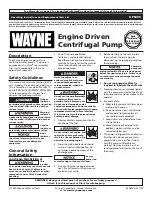
11
Subject to technical amendments without notice | 83059700gUK – Translation of the operating manual | ait-deutschland GmbH
Horizonzal connection
1. Open break-outs on the right sidewall
2. Trim the 4 hoses (accessories) to length if
required. Likewise the condensate hose, which
hangs loose from the condensate pan.
3. Attach the hoses and the condensation hose and
lead out on the right side.
1
2
5
3
4
1 Desuperheating return
2 Desuperheating supply
3 Heating circuit return
+HDWLQJFLUFXLWVXSSO\ÀRZ
5 Condensation hose
6.1 Condensate drain
The condensate precipitated from the air must be
removed frost-free via a condensate pipe with minimum
40 mm diameter. If surfaces are water permeable, it
LVVXႈFLHQF\IRUWKHFRQGHQVDWHZDWHUSLSHWREHODLG
vertically in the ground to a depth of at least 90 cm. If
the condensate is discharged into the sewer system,
ensure frost-free laying with a gradient.
Discharge of the condensate into the sewers is
permitted only via a funnel waste trap, which must be
accessible at all times.
Observe local regulations!
7
Electrical installation
Connect the electrical cables
ATTENTION
Irreparable damage to the compressor due to wrong
URWDWLQJ¿HOG
Ź (QVXUHWKDWWKHUHLVDFORFNZLVHURWDWLQJ¿HOGIRU
the compressor load infeed.
Basic information about the electrical
connection
Ɣ
7KH VSHFL¿FDWLRQV RI WKH ORFDO HQHUJ\ VXSSO\
companies may apply to electrical connections.
Ɣ
Fit the power supply for the heat pump with an
all-pole circuit breaker with at least 3 mm contact
spacing (acc. to IEC 60947-2).
Ɣ
Note
the
level
of
the
tripping
current
(
Æ
“Technical data/Scope of supply” on page
17).
Ɣ
Comply with the electromagnetic compatibility
regulations (EMC regulations).
Ɣ
Lay the control/sensor cables and device supply
FDEOHVXႈFLHQWO\IDUDSDUW!PP
Ɣ
Lay unshielded power supply cables and shielded
FDEOHVEXVFDEOHVXႈFLHQWO\IDUDSDUW
Ɣ
Do not lengthen the patch cable or the bus cable.
Bus cables up to 30 m long can be used when
the quality of the cable is the same as that of the
original cable.
Electrical connection
Pull in the cables and conductors and create the
connections
1. Strip the sheathing of all cables to the external
loads before laying in the cable gland of the switch
box.
2. Open electrical switch box.
3. Feed the control/sensor cables and unit supply
cable into the housing.
4. Connect cables to the respective terminals (
Æ
“Terminal diagram” on page 29).





































